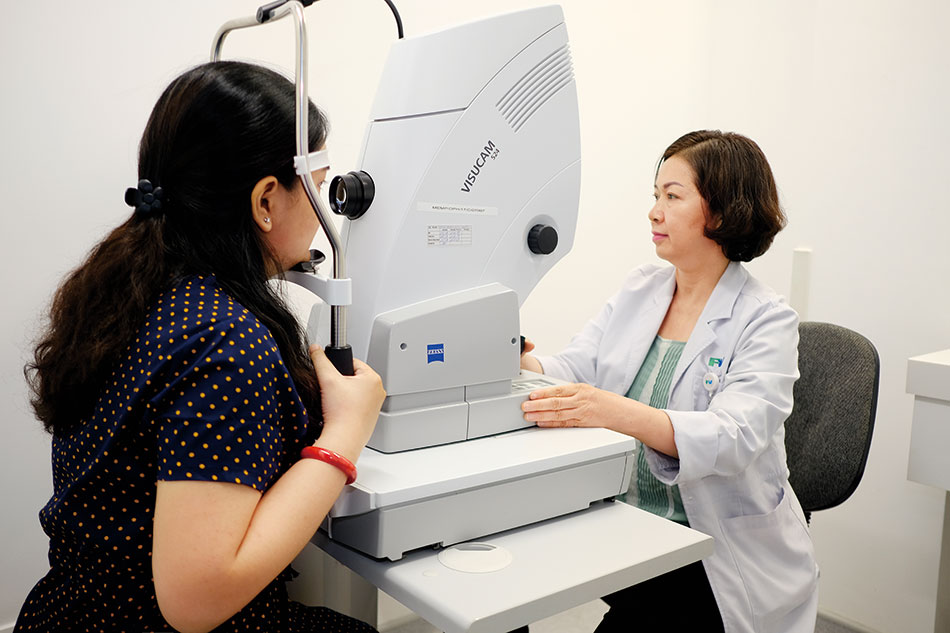Recently, the percentage of people being diagnosed with diabetes has seen a significant increase. This condition is very serious as it can cause many dangerous complications to the heart, kidneys, nerves, etc. One particularly serious complication affects the eyes, known as retinopathy. Globally, diabetic retinopathy is one of the leading causes of vision loss. If the condition is not detected and treated immediately, it can lead to severe damage to the interior surface of the eye, known as the fundus, causing problems such as; macular oedema, vitreous haemorrhage, retinal haemorrhage, among others. Of patients with type one diabetic retinopathy, 13% suffer from retinopathy within five years and 90% encounter retinopathy after 10 years. Of patients suffering from type two diabetic retinopathy, 40% of those taking insulin and 24% of those taking oral hypoglycaemic agents will develop retinopathy after five years.

Symptoms of Diabetic Retinopathy
Often those who have diabetes do not realise they have retinopathy complications until the disease worsens, or their vision has problems. Therefore, it is advised that people with diabetes should have a screening for this condition as early as possible to prevent such complications. Alternatively, patients should visit a doctor if they notice any small changes to their eyesight, these include:
- Loss of the ability to recognize colours.
- Experienced transient blurred vision.
- Appearance of black spots or flashes of light.
- Blurred vision when reading books or driving.
Prompt screening and treatment of Diabetic retinopathy helps reduce the risks of blindness
Through the specialised diabetic retinopathy screening programme at FV Hospital’s Ophthalmology & Refractive Surgery Department, patients will receive a comprehensive eye exam to assess the degree of diabetic retinopathy. This includes measurement and testing of vision; microscopic examination; intraocular pressure measurement; gonioscopy, and fundoscopic examination using Optical Coherence Tomography (OCT). In addition, Fundus Fluorescein Angiography (FFA) may be used to clearly investigate the cause of visual impairment, identify leaking blood vessels and be used as a guide for the treatment of macular oedema.

Depending on the stage of the condition when diagnosed, treatments for diabetic retinopathy will be divided into stages, including:
- The pre-proliferative retinopathy stage – Here, the doctor will treat the root by controlling blood glucose indicators. Particularly, the Hba1c index that indicates blood sugar three months earlier to limit complications.
- The proliferative retinopathy of symptoms stage – When symptoms, such as retinal oedema and haemorrhage, occur, the doctor will perform intravenous anti-proliferation or use the intraocular anti-inflammatory drug, Corticoide, with retinal laser photocoagulation. For severe cases, which are accompanied by a haemorrhage in the eye with scar tissue formation, the doctor may assign a surgical resection of the glasses in combination with other sophisticated surgical procedures.
Due to its many advantages, FV uses micro pulsed retina laser photocoagulation technology. This approach is able to shine directly on the macula and help reduce oedema without causing macular damage. The new technology overcomes many disadvantages which current common laser treatment methods possess. For example, the time the laser effects the tissue of the retina is very short and it does not cause any extensive burns, these both help to control its effects ensuring less damage to the retina. In addition, it is a safe or minimal treatment of the macula, minimizing complications and side effects of the laser.
Each patient will undergo a suitable treatment plan designed by the doctor depending on the stage of their condition. The doctor will coordinate with fellow specialists to plan the most appropriate and effective treatment, closely monitor its progress and spend time carefully advising each patient.
FV Hospital benefits from extensive modern equipment and a team of highly specialized doctors with many years of direct experience in performing such procedures. FV is also one of the few hospitals that has a process of infection control according to JCI international standards for patient safety, helping to ensure the safety of patients and their relatives from the risk of cross-infection. As a result, the infection rate at FV hospital is always controlled at less than 0.5%, 20 times less than other hospitals in Vietnam.
For more information, please visit: https://www.fvhospital.com/learn-more/diabetic-retinopathy/
To register for the Diabetic Retinopathy Screening Programme at FV Hospital’s Ophthalmology & Refractive Surgery Department, please visit: https://www.fvhospital.com/medical-services/health-screening-programmes/medical-screenings/diabetic-retinopathy-screening/
Tel: (028) 54 11 33 33 – EXT: 2000.



